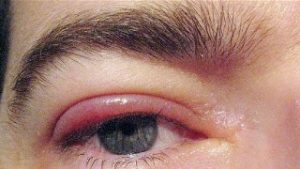Eye Swelling Causes and Treatment - Puffy Eyes Remedies

« Since yesterday morning, my eyes are swollen. The eyelids are red. It is rather painful, embarassing to see, and completely unattractive. I have worn sunglasses to go out and run errands and to hide my puffy eyes. Due to it being a public holiday, I was not able to consult a doctor. Would you know one or more home-made remedies for treating puffy eyes naturally ? »
The phenomenon of puffy eyes can have many different causes. Some people notice that they have puffy eyes on waking in the morning. Some women think that the swelling of the eyes may be due to poor quality makeup. In many cases, puffy eyes are coupled with other symptoms or with particular pathologies.
It is obvious that to find an effective remedy against swollen eyes, we must first identify the subjacent causes. That is why we will start by listing the common causes of the onset of symptoms of puffy eyes. Then we will propose solutions and natural remedies to treat puffy eyes.
Puffy Eyes and 10 of the Most Frequent Causes
1. Allergy and allergic conjunctivitis
Allergy is a common cause of inflammation of the eyes. In some sensitive individuals, contact with allergens such as pollens, grasses, dust, dust mites, cat hair, etc. triggers the following allergic reactions in the eye: the eyes swell (edema) and cries (tearing), the eye becomes red, light becomes unbearable and the patient feel a strong itching sensation. Allergic rhinitis (hay fever) and allergic conjunctivitis are often associated.
2. Bacterial, viral and parasitic infections
a) Infectious conjunctivitis : This is an inflammation of the conjunctiva caused by bacterial, viral or parasitic. It may also be due to exposure to a chemical or an allergy.
Symptoms: a red and watery eye, a pus-like discharge, sensation of sand in the eyes and of burns, eye fatigue, sensitivity to light and eye pain.
b) Infectious blepharitis : This is erythema (skin redness) accompanied by inflammation (edema) of the eyelid margins. Blepharitis is often associated with conjunctivitis is caused by a bacterial infection with staphylococcus, streptococcus, to pseudomona aeruginosa, a fungal infection (candidiasis, cryptococcosis, blastomycosis) or a viral infection.
Symptoms: burning, itching, sensation of a foreign body.
c) Chalazion : This is a cyst, a little unsightly, firm and painful lump in the skin of the upper or lower eyelid. The chalazion is caused by obstruction and inflammation of a channel that drains a sebaceous gland, called the meibomian gland. The chalazion is not caused by an infection, but it may leave room for an infection if not treated properly.
Symptoms: a reddish lump under the eyelid, swelling, irritation and sensitivity of the eyelid.
d) The stye : It’s a button or boil full of pus, located at the base of an eyelash, which is mostly caused by infection of Staphylococcus aureus (S. aureus), which causes swelling of the eyelid. The external stye is less painful and heals more easily than an internal stye.
Symptoms include swelling of part or all of the eyelid, redness, and pain in the eye.
e) Ocular herpes : The virus responsible for most cases of ocular herpes is type 1 herpes simplex virus ( HSV1). This type of virus can infect the eyes and cause corneal ulceration and edema.
Symptoms: the eye is red and weeping, the eyelid is more or less swollen and the patient has the sensation of grains of sand in the eye.
f) Keratitis : It is a condition of the cornea of an inflammatory or infectious origin.
Symptoms : watery eyes, redness in the white of the eye, swelling of the eyelid, eye itching and photosensitivity. Sometimes, in the absence of treatment, an ulcer occurs.
3. The phenomenon of puffy eyes upon awakening in the morning
Why do many people wake up in the morning with swollen and puffy eyes ?
During sleep, the lymphatic flow slows down, and causes some accumulation of fluid in the spongy tissue of the lower eyelid, where the skin is 5 to 10 times thinner than other parts of the body.
This fluid accumulation, combined with a slight retention of tear fluid, can lead to swelling of the eyelids in the morning on waking. Some people are more prone than others to puffy eyes in the morning, but this physiological phenomenon usually disappears shortly after waking up because the lymphatic circulation is restored quickly.
4. Certain diseases or conditions
Some diseases can be responsible for the phenomenon of puffy eyes. Measles and diabetes can cause inflammation of the eyes. Inflammatory diseases such as lupus, irritable colon, Steven Johnson Syndrome, Lyme disease, Crohn’s disease, Graves’ disease (thyroid disease) can also cause the eyes to swell.
5. Foreign matter in the eye
The penetration of a foreign body in the eye (dust, sand and particles of all kinds) that is trapped under the eyelid can cause an unpleasant tingling, red eyes and local inflammation.
6. Poor quality cosmetics
Each year, more than 30,000 cases of allergies caused by cosmetic products are reported, and there are probably more than a million unreported cases. Of the thousands of ingredients are used in the manufacture of cosmetic products, many are harmless when used properly, but some of them can cause allergies or infections, as is often the case with mascaras, and lead to symptoms of puffy eyes.
7. Fatigue, lack of sleep and bad habits daily
It is no secret that a lack of sleep and overwork contributes to the phenomenon of puffy eyes. What are bad habits in daily life? Watching TV or staying in front of his computer screen for hours causes eye fatigue, and sometimes eye pain accompanied by a slight swelling of the eyes. Similarly, too weak or too strong lighting can affect the eyes.
8. Water Retention
A poor lymphatic drainage under the eyes water may be responsible for a gradual accumulation of water (water retention) which is responsible for fat and form dark circles and the famous ‘bags under the eyes’.
9. Incorrect use of contact lenses
Improper usage of contact lenses is a common cause of inflammation or infection in the eyes. Contact lenses worn too long or improperly positioned can irritate the eyes and lead to local inflammation. Poorly maintained contact lenses may be responsible for bacterial contamination of the eye. Some sensitivity to lens materials can also lead to ocular allergy.
10. Age, alcohol, smoking and stress
Malar pockets, famous pockets beneath the lower eyelids may be related to age, excessive alcohol consumption, smoking or stress. Lymphatic drainage decreases, the skin loses its elasticity and fades, leaving room for ugly bags under the eyes.
Puffy Eyes and Conventional Remedies
1. Puffy Eyes and bacterial infections
If the cause of puffy eyes is of bacterial origin, as is the case of some types of conjunctivitis, infectious blepharitis, keratitis and sties, your doctor or ophthalmologist will prescribe an ointment, eye pomade or antibiotic eye drops for local application. Topical ophthalmic antibiotics gentamicin, ciprofloxacin, gatifloxacin, moxifloxacin, fusidic acid and ofloxacin are among the most prescribed.
2. PSwollen eyelids and viral infection
In the case of ocular herpes caused by herpes simplex virus (HSV), the treatment is based on the application of an antiviral eye ointment such as acyclovir (Zovirax ®) and possibly atropine to put the eye at rest and reduce inflammation and pain.
3. Puffy Eyes and allergies
Among the remedies prescribed to treat allergic reactions, there are antihistamines drops (Allergodil ®, Levophta ®, Lemadine ®, Opatanol ®) eye drops and allergy in the family cromones (Tilavist ®, Opticron ®, lodoxamide) that prevent the local degranulation of mast cells and the release of mediators of inflammation.
Antiallergic antihistaminic eyedrops as Allergodil ® and Naaxia ® are also used. In some cases, glucocorticoids may be prescribed in the form of eye drops (dexamethasone, prednisolone, fluorometholone, etc.) for their potent anti-inflammatory and antiallergic effects. Taking antihistamines orally may be useful in the treatment of allergic conjunctivitis.
Home-Made Remedies against Eye Swelling
Most natural remedies listed below can help reduce the symptoms of puffy eyes linked to fatigue, local irritation, cigarette smoke, etc. When the cause is infectious and seems related to an underlying disease, one should always consult a specialist.
1) Cucumber: Take a cucumber from the refrigerator. Cut the cucumber into thin slices and place a slice on each swollen eye. Let the cucumber act on your eyes for 20 minutes. Cold cucumber causes constriction of blood vessels and deflates the eye somewhat. This will relieve the pain.
2) Potato: You will also get similar therapeutic benefits from cold potato slices. Follow the same guidelines as previously given for cucumbers.
3) Cold spoon: ice or cold is generally used to induce capillary and arteriolar vasoconstriction in order to reduce the swelling or inflammation of the tissues. It is not advisable to put ice directly on the eye. Rather, you can use a cold metal spoon previously left in the refrigerator to deflate the eye and numb the tissue to relieve pain.
Natural Remedies – Herbal Infusions for Puffy Eyes
1) Chamomile : Roman Chamomile (Chamaemelum nobile) is known for its soothing and calming properties. Infuse 2 bags of chamomile in 3 cups of hot water. Cool and apply a sterile gauze soaked in chamomile infusion on the swollen eye for fifteen minutes, or perform an eye bath. Repeat this 3-4 times a day. Chamomile helps reduce the redness and irritation associated with infection of the eyes.
2) Green Tea : Prepare an infusion with two bags of green tea (Camellia sinensis) and let the bags cool in the refrigerator. Once cooled completely, place them on your puffy eyes for twenty minutes. Green tea contains a lot of tannin which deflates the eye. The cold also brings some relief from pain.
3) Blueberry : The hydrosol cornflower (Centaurea cyanus) contains flavonoids with a useful decongestant to relieve the symptoms of tired eyes and swollen and irritated eyelids. Blueberries also have antiseptic properties.
4) Yellow Sweet Clover : The officinale sweet clover (Melilotus officinalis) contains coumarins, tannins, essential oils and flavonoids which exert on the eye antispasmodic, anti-edematous, antiseptic, soothing and sedative action. The flowering tops of this plant are often used in herbal medicine as floral water to reduce the symptoms of puffy eyes, conjunctivitis and blepharitis.
Homeopathic Remedies to Treat a Swollen Eye
1) Apis Mellifica : Apis mellifera or Apis mellifica is a homeopathic remedy that provides quick relief in the case of swelling, edema, redness, burning, stinging , itching and pain in the eye.
Apis is used to treat swollen eyelids, swelling under the eyes, watery eyes, sties, some forms of chalazion, keratoconjunctivitis and conjunctiva (viral, infectious and allergic). Apis is often prescribed in low dilution (5 CH) to treat acute and local conditions. Always consult a homeopath!
2) Euphrasia officinalis : In homeopathic treatment, Euphrasia officinalis is useful to treat rhinoconjunctivitis which is accompanied by swelling of the eye and watery eyes .
Author : Alexis ROGER
Weight Loss Juice with Parsley
Brain Teaser
__________

